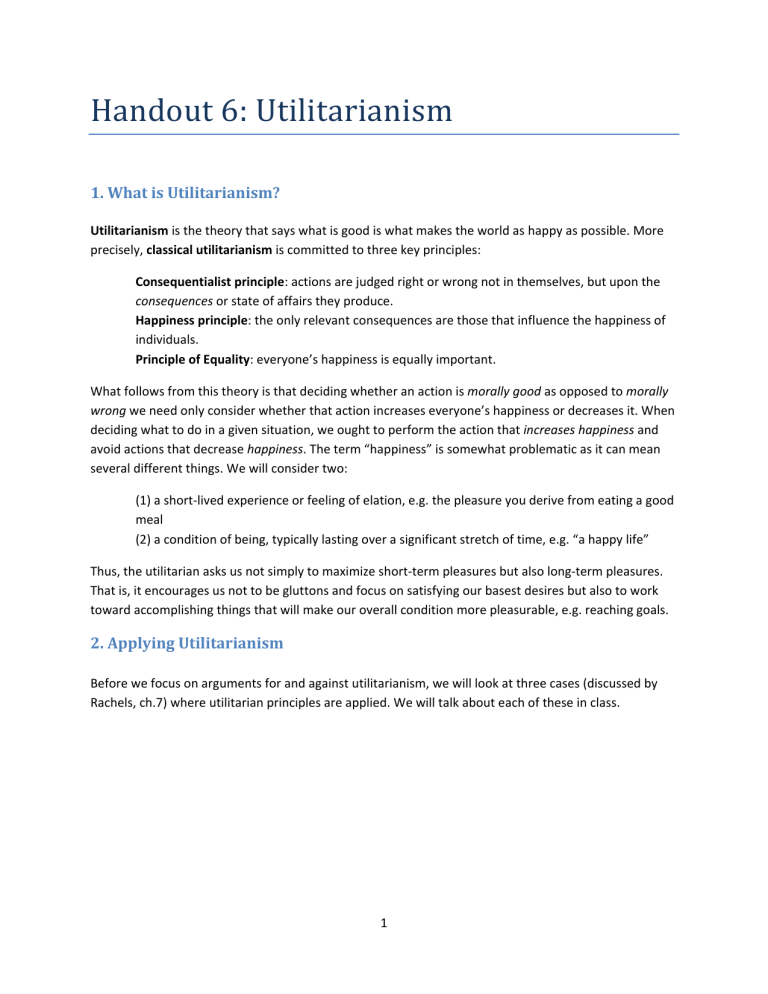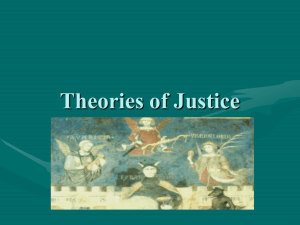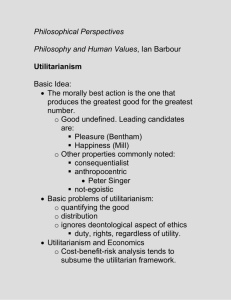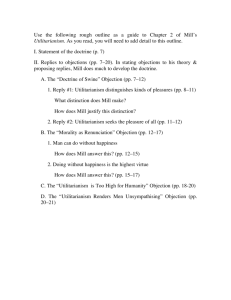Handout 6: Utilitarianism

Handout 6: Utilitarianism
1. What is Utilitarianism?
Utilitarianism is the theory that says what is good is what makes the world as happy as possible. More precisely, classical utilitarianism is committed to three key principles:
Consequentialist principle : actions are judged right or wrong not in themselves, but upon the consequences or state of affairs they produce.
Happiness principle : the only relevant consequences are those that influence the happiness of individuals.
Principle of Equality : everyone’s happiness is equally important.
What follows from this theory is that deciding whether an action is morally good as opposed to morally wrong we need only consider whether that action increases everyone’s happiness or decreases it. When deciding what to do in a given situation, we ought to perform the action that increases happiness and avoid actions that decrease happiness . The term “happiness” is somewhat problematic as it can mean several different things. We will consider two:
(1) a short-lived experience or feeling of elation, e.g. the pleasure you derive from eating a good meal
(2) a condition of being, typically lasting over a significant stretch of time, e.g. “a happy life”
Thus, the utilitarian asks us not simply to maximize short-term pleasures but also long-term pleasures.
That is, it encourages us not to be gluttons and focus on satisfying our basest desires but also to work toward accomplishing things that will make our overall condition more pleasurable, e.g. reaching goals.
2. Applying Utilitarianism
Before we focus on arguments for and against utilitarianism, we will look at three cases (discussed by
Rachels, ch.7) where utilitarian principles are applied. We will talk about each of these in class.
1
2.1. Euthanasia
2.2. Marijuana
2.3. Nonhuman Animals
3. Objections to Utilitarianism
Objection #1: Utilitarianism Relies on Hedonism and Hedonism is False
P1: The utilitarian accepts the happiness principle and so reduces all morality to pleasure-seeking.
P2: However, even if the type of pleasure we seek is not base in nature, there are things we think are valuable that are not pleasure, e.g. honesty, bravery, etc.
C: Therefore, utilitarianism is false.
Objection #2: Utilitarian accepts the consequence principle and this principle is false.
Objection #2.1: Utilitarianism is incompatible with fairness and justice
P1: If utilitarianism is true, then sometimes unjust acts would be morally permissible (e.g., convicting someone for a crime they did not commit to make people happy).
P2: It would be wrong to convict a person for a crime they did not commit.
C: Therefore, utilitarianism is not true.
Objection #2.2: Utilitarianism allows for violating rights
P1: If utilitarianism is true, then sometimes it is acceptable to violate someone’s basic human and legal rights (e.g. right to privacy, life, right to not be unlawfully detained, etc.)
P2: It is not acceptable to violate someone’s basic human and legal rights.
C: Therefore, utilitarianism is not true.
In the above examples, utilitarianism allows for actions that would be considered unjust and a violation of rights. But, as it is articulated, utilitarianism allows for such actions provided it increases the total amount of happiness. It thus always puts the good of the many over the good of the few.
Objection #2.3: Utilitarianism Ignores the Past
P1: If utilitarianism is true, then we should solely focus on the consequences that will result from an action and ignore any factors that led to that action.
P2: There are times when factors that lead up to an action matter for how we evaluate the goodness or wrongness of an action, e.g. making/breaking promises, evil actions, etc.
C: Therefore, utilitarianism is not true.
Objection #3: Utilitarian accepts the consequence principle and this principle is false.
2
Objection 3.1: Utilitarianism is too demanding
Given the current state of the world and the impoverished state so many people live in, treating everyone’s happiness equally would currently demand that we give away nearly all of our money and do everything we can to help others (of course, we should not give away so much that we decrease happiness). On the basis of this, people reject utilitarianism because (i) they think that this asks too much of us and it (ii) confuses acts that are supererogatory (one’s that go above and beyond our moral requirements) rather than obligatory.
Objection 3.2: Utilitarianism undermines true friendships
P1: The equality principle of utilitarianism does not allow us to be preferential toward family members, loved ones, or friends.
P2: No one could ever consistently adopt a non-preferential attitude.
C: Therefore, utilitarianism is an unreasonable theory that should be rejected.
4. Defending Utilitarianism
Defense #1: Consider the Consequences!
The first argument against utilitarianism is that it is incompatible with fairness, justice and rights.
Arguments have the following structure:
P1: If utilitarianism is true, then it allows some bad thing to happen.
P2: Ethical theories should not allow bad things to happen.
C: Therefore, utilitarianism is not true.
But, P1 is false. Consider the following argument:
P1: If utilitarianism is true, then it is morally permissible to lie to your friend.
P2: Ethical theories should not allow lying.
C: Therefore, utilitarianism is not true.
However, a utilitarian can argue that P1 is false because a careful consideration of the consequences would show that lying decreases happiness. That is, in the short-term you may think that lying will help you get away with x, y, or z, but it seems as though you will ultimately get caught and this will have very bad consequences , e.g. no one will trust you, your friends will dislike you, etc.
Argument #2: A Modification to Utilitarianism: Act vs. Rule
The version of utilitarianism we have been considering is act utilitarianism . This species of utilitarianism says that particular acts are good or bad according to whether that act increases or decreases happiness. One problem with the act utilitarian approach is that it seems to allow for some exceptionally bad actions in certain situations, e.g. murdering someone and selling their organs (provided no one hears about this and the person you kill won’t be missed). These sorts of situations seem horrifying and so utilitarianism seems in trouble.
3
One way to fix this problem is to adopt what rule utilitarianism . This species of utilitarianism says that a particular act is good or bad provided it is done according to certain rules that generally maximize happiness. In other words, rule utilitarianism says an action is morally good if it is done in accordance with a rule that yields (overall) happy consequences and morally wrong if it is done in accordance with a rule that does not yield a favorably happy outcome.
Rule utilitarianism appears to deal with the objections about unlawfully throwing people in jail, violating people’s rights, and ignoring previous factors by saying that the rules that motivate such actions would lead to unhappy consequences , therefore they are wrong.
Argument #3: Utilitarianism and Common Sense
Argument #3.1: Utilitarianism Explains Common Sense Morality
If we consider the various moral principles we hold (e.g. don’t lie to friends), we can ask ourselves the following question: why do we accept these principles?
One answer to this question is that because holding to such a principle, on the whole, makes people happy more often than not. And so, the utilitarian can argue as follows:
P1: We would only accept an ethical theory that can explain the moral principles we currently hold.
P2: Utilitarianism best explains our current moral principles.
C: Therefore, we should accept utilitarianism.
Argument #3.2: Faulty Intuitions and biting the common Sense Bullet
Another response for the utilitarian is to simply bite the bullet. Yes, utilitarianism goes against our intuitions about justice and rights, but this is because our intuitions are wrong. Yes, utilitarianism is demanding in terms of what it asks us to do, but this is because human beings tend to be bad people and should radically change their lives. Our intuitions about what is right and wrong have been wrong in the past (e.g. slavery) and there are probably other beliefs we have that are also wrong.
In addition, the fact that utilitarianism is an extreme position does not make it false.
Argument #3.3: Selective Attention
The arguments against utilitarianism focus on the negative consequences of utilitarianism, but a different picture emerges if we think about all of the consequences of being a utilitarian.
Case #1: Wrongfully convicting someone makes the person who was convicted unhappy, but what about all of the good that came of this, e.g. makes the family of an unknown killer happy, eases hysteria, etc.
Case #2: Breaking a promise or lying to a friend might make your friend unhappy, but what
4
about the happiness it brings into the world? Lying to your friend might make them feel better about themselves (just don’t get caught).
The point is that even though utilitarianism does not square with our intuitions about what is right and wrong, it may be that we are selectively focusing on the negative consequences and not paying attention to the happiness that a particular a good action brings in.
READING QUESTIONS
Ch.7
1. What is utilitarianism?
2. For the utilitarian, is euthanasia ever morally acceptable?
3. For the utilitarian, is the use of marijuana ever morally acceptable?
4. According to the utilitarian, must animals and humans be treated the same way?
5. What is “speciesism”?
6. With respect to utilitarianism, what moral does Rachels draw about eating meat?
Ch.8
1. What is the difference between act utilitarianism?
2. What is rule utilitarianism?
3. Give one argument for utilitarianism
4. Give one argument against utilitarianism?
CLASSROOM DISCUSSION QUESTIONS
FURTHER READING
5








